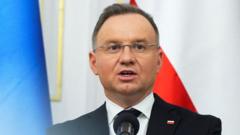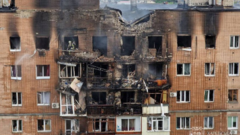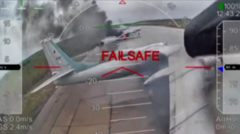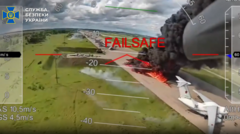In a recent interview, Poland's President Andrzej Duda made headlines at the World Economic Forum in Davos by firmly opposing any restoration of Russian gas supplies to Western Europe, even in the event of a peace deal between Russia and Ukraine. Duda emphasized that the Nord Stream pipelines, which have remained inactive since 2022, should be dismantled to prevent countries like Germany from resuming Russian gas imports to alleviate their own economic struggles.
Poland's President Advocates for Permanent Halt of Russian Gas Supplies

Poland's President Advocates for Permanent Halt of Russian Gas Supplies
Poland's President Andrzej Duda urges European leaders to permanently stop Russian gas flows, insisting the Nord Stream pipelines must be dismantled to prevent economic domination.
Duda expressed hope that European leaders have learned from Russia's aggression towards Ukraine, advocating for a unified stance against any attempts to restore gas flow through these pipelines. He believes that the ongoing economic sanctions on Russia are having an impact and that it is crucial for European nations to resist corporate pressures to re-establish trading links.
The Nord Stream pipelines, constructed by Russia's Gazprom, connect the country to northern Germany. They were rendered inoperable due to the conflict that escalated in 2022, with both lines suffering significant damage from explosions. Despite this, rising gas prices in Europe and political sentiments from Germany's far-right AfD party suggesting a revival of the pipeline operations have left the issue contentious.
Duda articulated strong concerns that the pipelines pose multiple threats, not just to Ukraine but also to Central European nations including Poland and Slovakia, framing it as an economic and military risk that could allow Russia to exert undue influence over Europe.
In discussing the potential for peace negotiations, Duda stressed the necessity for Ukraine to be included and voiced his disapproval of any arrangement that would legitimize Russia's territorial acquisitions in Ukraine, asserting that these actions violate international law.
He pointed out the rising influence of U.S. involvement, especially under President Donald Trump, whose leadership could steer NATO's response to the crisis. Duda concluded by reiterating the importance of international solidarity against Russian advances and ensuring that Ukraine remains unyielded in the face of aggression.
The Nord Stream pipelines, constructed by Russia's Gazprom, connect the country to northern Germany. They were rendered inoperable due to the conflict that escalated in 2022, with both lines suffering significant damage from explosions. Despite this, rising gas prices in Europe and political sentiments from Germany's far-right AfD party suggesting a revival of the pipeline operations have left the issue contentious.
Duda articulated strong concerns that the pipelines pose multiple threats, not just to Ukraine but also to Central European nations including Poland and Slovakia, framing it as an economic and military risk that could allow Russia to exert undue influence over Europe.
In discussing the potential for peace negotiations, Duda stressed the necessity for Ukraine to be included and voiced his disapproval of any arrangement that would legitimize Russia's territorial acquisitions in Ukraine, asserting that these actions violate international law.
He pointed out the rising influence of U.S. involvement, especially under President Donald Trump, whose leadership could steer NATO's response to the crisis. Duda concluded by reiterating the importance of international solidarity against Russian advances and ensuring that Ukraine remains unyielded in the face of aggression.























